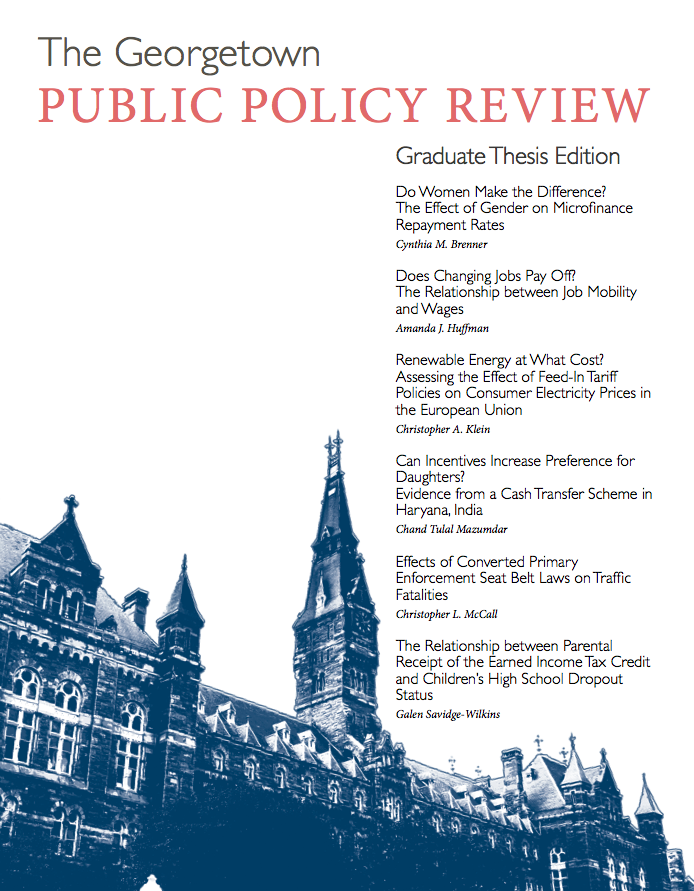This volume marks the second annual Georgetown Public Policy Review Graduate Thesis Edition, showcasing the sound research and policy analysis conducted by recent Georgetown Public Policy Institute (GPPI) graduates. As part of the GPPI capstone experience, students have the option of completing a quantitative thesis in partial fulfillment of the Master of Public Policy degree at Georgetown University. The Graduate Thesis Edition is reserved for those theses that showcase superior and relevant policy analysis and particularly thoughtful writing.
The Graduate Thesis Edition is peer reviewed by Georgetown faculty and publishes condensed versions of the authors’ original theses. The result has been a powerful addition to The Review’s annual journals that draw on empirical analysis from the broader academic and policy communities.
In this issue, we begin with the work of Cynthia Brenner, who explores the role of gender on microfinance repayment in 110 countries. Using ordinary least squares and fixed-effects models, she finds strong evidence that, at a certain point, women pay back their loans at a greater rate than men do. This has major implications for microfinance institutions as they look to increase their financial sustainability.
On the domestic front, former Review editor Amanda Huffman explores the relationship between job mobility and wages. Her study suggests a previously unexplored link to tenure and experience, filling a gap in the job mobility literature. Utilizing a fixed-effects regression model, Huffman’s analysis helps inform labor policies aimed at increasing wages of workers in the United States by determining when and how often workers should change jobs to maximize earnings potential.
Christopher Klein weighs in on the debate over feed-in tariff (FIT) policies in the European Union on whether encouraging renewable resource investment comes at the cost of higher electricity prices for consumers. His rigorous analysis employs a dynamic panel data model that captures both country- and year-specific effects for 20 European countries over time. Ultimately, he concludes that FITs have in fact had a relatively small effect on electricity prices, suggesting that these policies are both effective and economically viable.
We then turn to Chand Mazumdar’s analysis of the gender imbalance in India and whether policies aimed at increasing household preferences for daughters have been effective. She uses a difference-in-differences model that compares two neighboring states to assess the impact of a cash transfer scheme on the likelihood of families having a second daughter. Her findings suggest that such policies may not yield their intended results very significantly.
Shifting back to the US, Christopher McCall delves into the issue of seat belt laws and whether states with tougher enforcement see fewer traffic fatalities. He expands upon research in the existing literature and, by using state-level fixed-effects models, finds a significant negative effect of upgrading to primary seat belt enforcement laws on car-related deaths. These results are even stronger in more populous states and in certain regions of the country, finding evidence to support more resources devoted to seat belt laws at the state level.
Our last study by Galen Savidge-Wilkins adds a unique analysis to the plethora of research on the Earned Income Tax Credit (EITC) in the US by looking at its specific effects on children’s high school graduation rates. He employs a linear probability model to conclude that when parents receive the EITC at certain points in their children’s lives, those children are more likely to graduate from high school. His findings suggest that policies aimed at family economic intervention may have positive implications for educational outcomes.
Each author carves out a unique analysis in his or her respective field of study, greatly contributing to academic and policy research. We cannot thank authors Brenner, Huffman, Klein, Mazumdar, McCall, and Savidge-Wilkins enough for working with us throughout the editorial process. We hope our readers similarly find this volume of the Graduate Thesis Edition rewarding and thought provoking, adding important nuances and layers to the dynamic policy conversation across the globe.
Would you like to order a print copy? Email executivefinance@gppreview.com for details. Copies are $20 for institutions and $10 for individuals.
